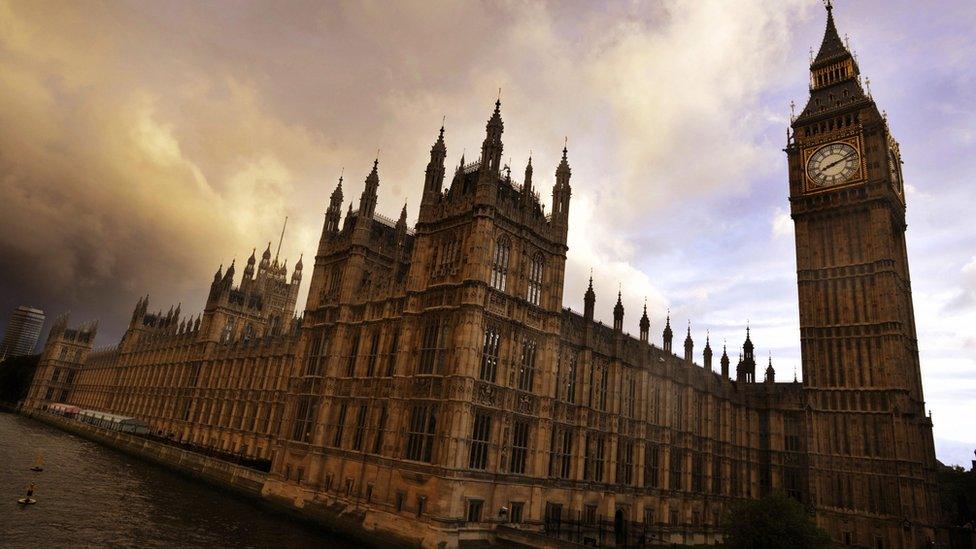The week ahead in Parliament
- Published
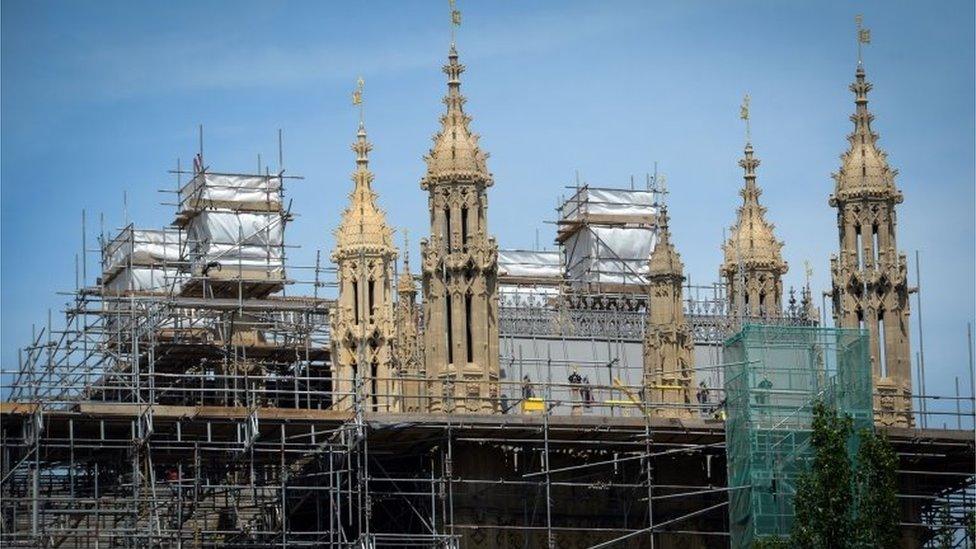
It's déjà vu all over again in the Commons, as MPs prepare for another round of debate on whether or not they should move out of their Victorian home, to make way for a multi-billion pound restoration project.
Simple souls may have thought a firm decision had been made, but no.
Concerns about the visible deterioration of Parliament's buildings war with political concerns about the cost of putting them right - and a debate on Thursday could pave the way for a policy reversal, or confirm that there is no practical alternative (see below).
There could also be some entertainment around the long-delayed establishment of Parliament's Intelligence and Security Committee - which should lead to the even longer-delayed publication of their report into Russian interference in UK politics.
Meanwhile there's a lot of hard legislating as MPs enter the glide path to their summer break, with money bills being processed and loose ends tied up. Over in the Lords, there's a bit of a lull, but there are lots of second readings coming up in their Lordships' final fortnight before the summer break including bills on immigration, medicines, and constituency boundaries.
Here's my rundown of the week ahead.
Monday 13 July
The Commons meets (14:30) for Home Office Questions, after which, expect the usual crop of post-weekend statements and urgent questions.
The main business is the Supply and Estimates Bill, which enacts the government's spending plans - followed by the rushing through of the bill to bring in the temporary cut in stamp duty announced by the chancellor in his Summer Statement.
The adjournment debate, led by the Conservative, Bob Seely, is on the pressures on independent pharmacies.
Watch out, too, for the government's long-awaited motion setting the membership of Intelligence and Security Committee to allow it to start work after the longest hiatus in its history.
The motion can be debated for up to 90 minutes, which will provide plenty of opportunities to press for the publication of the long-awaited report on Russia.
There may also be some discussion of the government decision to name the former Lord Chancellor, Chris Grayling, as the new chair, succeeding the now-departed Dominic Grieve.
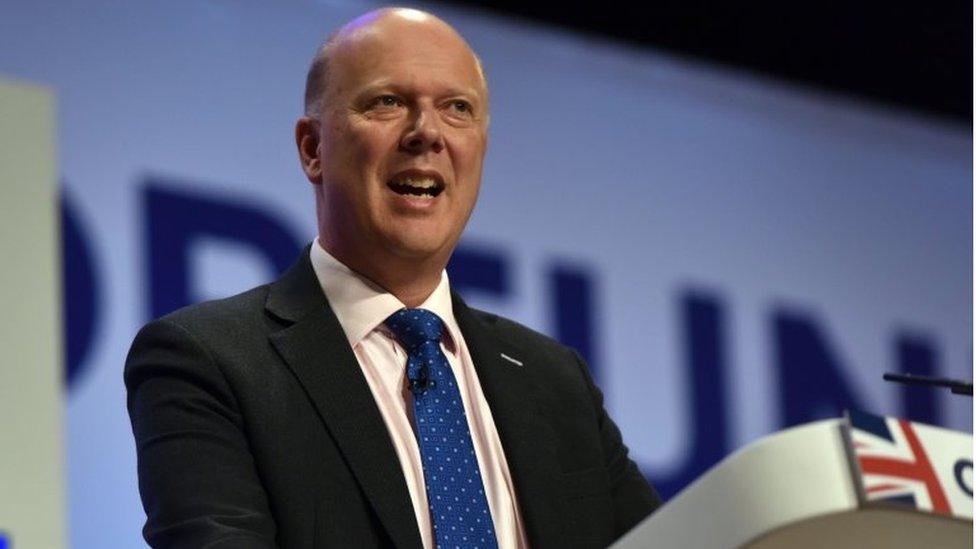
Chris Grayling was transport secretary under Theresa May
The other members from the Commons will be Sir John Hayes (C) , Stewart Hosie (SNP) , Dame Diana Johnson (Lab), Kevan Jones (Lab), Dr Julian Lewis (C), Mark Pritchard (C) and Theresa Villiers (C). A parallel motion in the Lords will appoint their one member on Tuesday.
On the Committee Corridor, Public Accounts Committee (14:30) takes evidence on Immigration Enforcement from the top civil servant at the Home Office, Matthew Rycroft and his No 2 Shona Dunn plus Tyson Hepple, the Director General of Immigration Enforcement.
The first two witnesses endured a bruising encounter with the Home Affairs Committee, a week ago, when they were quizzed about the Windrush scandal.
In the Lords, (13:00) peers question ministers on assistance to performing arts companies and venues, the situation in Libya and preventing an increase in homelessness once the pandemic ban on evictions is lifted (that one is from the Big Issue founder, Lord Bird) and the impact of the Covid-19 pandemic and desert locusts on food security in East Africa.
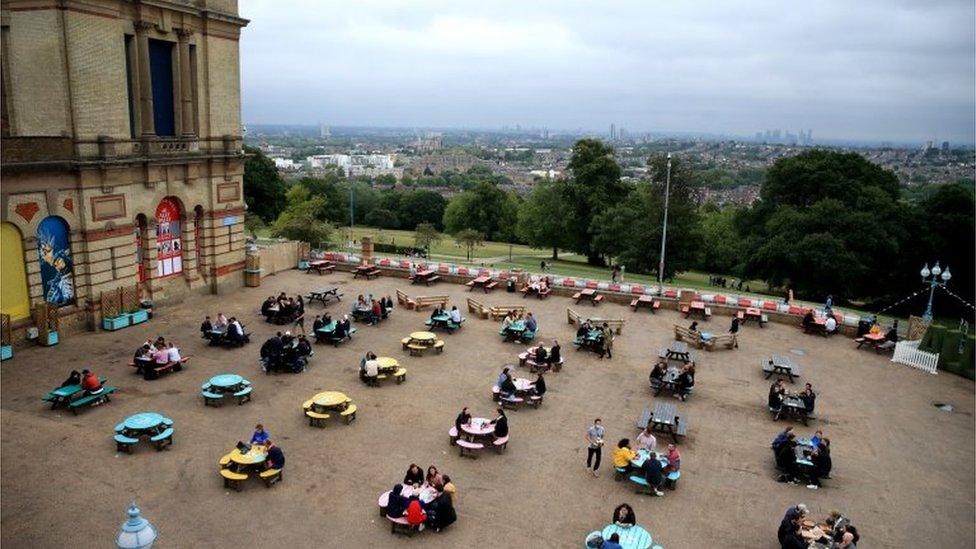
The main legislative action is the Committee Stage consideration of the Business and Planning Bill, which is being rushed through to help the economy recover from the pandemic.
It will allow pubs and restaurants to apply for licenses to sell alcohol for off-premises consumption and most of the amendments focus on tightening the system for licensing sales - for example by saying sales must stop at 11pm.
An interesting player in these debates may be the Lib Dem Baroness Thornhill, a former Mayor of Watford, who devoted considerable effort to coping with the impact of nightlife on local residents. Serious attempts to change the bill may well follow at Report Stage a week later.
Aficionados of the Lords committee work should keep an eye on the Lords Liaison Committee (10:45) which will be hearing bids from a series of peers for subjects for the next set of special inquiry committees.
Tuesday 14 July
MPs begin their day (11:30) with Justice Questions.
The Ten Minute Rule Bill from Labour MP Liz Twist calls for a review of the Disabled Facilities Grants system - which offers a means-tested grant of up to £30,000 for people with a permanent disability to make changes to their home - a walk-in shower or a stair lift, for example - to help them to continue living there.
Then MPs polish off the Parliamentary Constituencies Bill - which now does not reduce their numbers to 600, but which does bring in a strict population quota to equalise the number of voters in constituencies.
The Conservatives will say it irons out a serious unfairness in the electoral system, while Labour will argue that more needs to be done to register voters, particularly in the inner cities.
The adjournment debate, led by Labour MP Rushanara Ali, is on funding for the removal of flammable cladding,
My committee pick is the Defence Committee hearing (14.30) on the UK and Defence's preparations for pandemics, the Ministry of Defence (MoD) and government's adaptations of plans in response to Covid-19, the Armed Forces and MoD's contribution, as well as what lessons should be learned.
They will hear from three expert witnesses: Professor David Alexander, professor of risk and disaster reduction at University College London, Dr Jennifer Cole, research fellow in antimicrobial resistance at Royal Holloway, and Bruce Mann, who was director of the civil contingencies secretariat in the Cabinet Office.
Elsewhere, the Committee on the Future Relationship with the European Union (10:00) has an evidence session on the progress of the negotiations on the UK's Future Relationship with the EU - and on another Brexit-related matter, watch out for the publication of the Northern Ireland Affairs Committee report, Unfettered Access: Northern Ireland and customs arrangements after Brexit - and any follow-up to that in the chamber.
In the Lords (12:00) questions range across recognising Taiwan as an independent sovereign state, ensuring that a COVID-19 vaccine is available affordable and clauses protecting human rights and maintaining environmental standards in post-Brexit trade agreements.
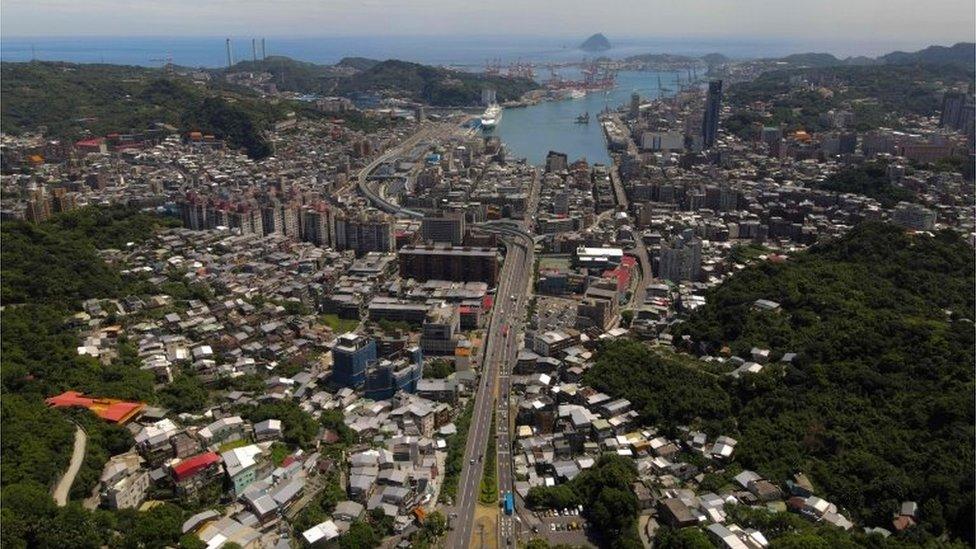
Keelung City is a port city in Taiwan
Then peers continue grinding through the detail of the Agriculture Bill, with day three of Committee Stage consideration.
This is going rather slowly - originally it had been scheduled for four days in committee, but two extra days have now been added to the calendar, which, in turn, will probably mean an extra day of Report Stage consideration.
There is also a motion to appoint the former Home Office Minister and security advisor to Gordon Brown, Lord West of Spithead, as a member of the Intelligence and Security Committee.
Wednesday 15 July
The Commons kicks off (11:30) with half an hour of International Development Questions - which might be rather a mournful occasion as it will probably be the last such question time, with the Department for International Development (DfID) due to be absorbed into the Foreign Office in September.
So the demeanour of Secretary of State Anne-Marie Trevelyan will be worth watching. And then it's Prime Minister's Question Time
The day's Ten Minute Rule Bill is on Tree-Lined Streets - with the Conservative, Chris Clarkson, seeking to place a requirement on major new developments to ensure streets are lined with trees. On the argument that greenery in the urban environment has a positive impact on mental and our physical health, and that street trees are associated with cleaner air, more physical activity and improved health and well-being.

The main debate will be on an Opposition Day motion from the SNP - at the time of writing they're being coy about the subject.
On the committee corridor, the Chancellor, Rishi Sunak, will field questions from the Treasury Committee about his Summer Statement (14:30).
Elsewhere, Northern Ireland Affairs takes evidence on the Legacy of Northern Ireland's past: The UK Government's New Proposals (09:30); Work and Pensions quiz the Welfare Delivery Minister, Will Quince on the wait for a first Universal Credit payment (09:30); Transport (09:30) continues its look at the issues around e-scooters with technology companies and Transport minister Rachel MacLean; International Trade Committee (14:30) takes evidence on UK Freeports and Women and Equalities (14:30) have a panel of ministers before them in their inquiry, Unequal impact? Coronavirus and BAME people - Equalities minister Kemi Badenoch, Public Health minister Jo Churchill, and Housing Minister Chris Pincher round off the evidence-taking.
In the Lords (12.00) question time ranges across the number of children living in poverty in working households , the announcement of the chair, timings and terms of reference of the Royal Commission on criminal justice and racism within the Metropolitan Police.
Then peers rattle through a series of legislative chores, starting with the Third Reading Pension Schemes Bill, which should be a brief rubber-stamping.
Next comes the Enterprise Act 2002 (Specification of Additional Section 58 Consideration) Order which aims to ensure that critical UK public health and crisis mitigation capabilities, are not lost in takeovers and mergers with foreign companies and that will be debated together with the Enterprise Act 2002 (Share of Supply) (Amendment) Order 2020 which increases the government's powers to scrutinise mergers in sensitive sectors of the economy artificial intelligence, cryptographic authentication technology and advanced materials.
Peers will also scrutinise the Competition Appeal Tribunal (Coronavirus) (Recording and Broadcasting) Order 2020 - which will allow Competition Appeal Tribunal hearings to be broadcast by video.
And, finally they will approve a motion to seek Royal Assent for a Church of England measure transferring Episcopal oversight of Channel Islands to the see of Salisbury.
Formerly in Winchester, temporarily in Canterbury, Salisbury is intended to be their long-term harbour. The move was agreed by the General Synod in February.
Thursday 16 July
MPs begin their day (09:30) with questions to the Chancellor of the Duchy of Lancaster and Minister for the Cabinet Office (aka Michael Gove), followed by the weekly Commons business statement from the Leader of the House.
Unusually for a Thursday, but probably briefly, there's a Second Reading debate on the Non-domestic Rating (Public Lavatories) Bill, a technical tidying-up measure that probably won't detain MPs for long.
But then they more to a general debate on the multi-billion pound plan to revamp the Victorian home of Parliament, known in Westminster as "Restoration and Renewal," or R&R for short.
As things stand, MPs have agreed that they will move out of their Victorian-gothic part of the parliamentary estate for several years, while essential work is completed and have set up a delivery authority set up to oversee the project.
The reasoning is that it is impossible to complete the necessary comprehensive work to replace crumbling stonework, out of date wiring and failing services with MPs and Lords still in residence - not least because of the dangers posed by asbestos.
The plan is based on the view that the building cannot practically be renovated in sections, so MPs will be relocated to a new temporary chamber and offices located on the site of Richmond House, the former home of the Department of Health, which would mostly be demolished and rebuilt.
But a number of MPs have never been reconciled to this decision - the Leader of the Commons, Jacob Rees-Mogg is a sceptic - and this debate looks like their fightback.
Leading the charge, the ex-minister Sir Edward Leigh, who argues that the Chamber of the Lords could be kept going, thus eliminating the need for a temporary chamber, and the whole exercise could then be accomplished at a much lower cost.
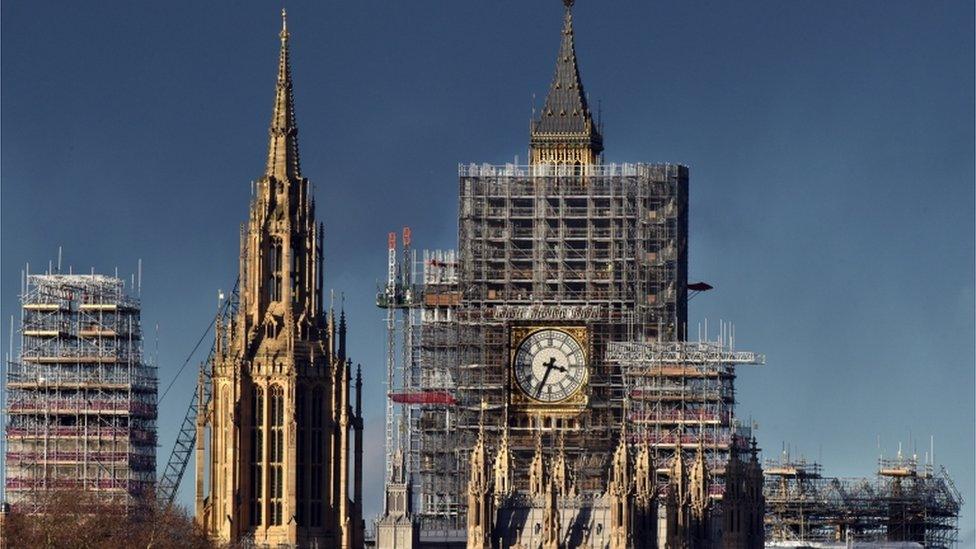
What the debate will illustrate is the difficulty of routing an intricate multi-billion pound restoration of a world heritage building through the Byzantine internal structures of Parliament.
Theoretically this is a "house matter," concerning the running of the Commons and Lords, but given the several billion pounds involved, the government has a stake as well, and there are suggestions that Downing Street is jittery about the cost.
A possible final bill of £4bn is often quoted, but this is a ballpark estimate made several years ago; no-one can really be sure.
Two past Leaders of the House, Andrea Leadsom and Chris Grayling are backing the original scheme - and its supporters point to the current need to maintain a 24-hour seven-day-a-week fire patrol, recent incidents where chunks of masonry have fallen off the building, mercifully without hitting anyone, and the malodorous miasma emanating from the Victorian lavatories.
They, and other key figures like Meg Hillier, the Labour ex-minister who now chairs the Public Accounts Committee, argue that it would be more costly and outright dangerous to attempt the restoration work with the parliamentarians in situ.
It is an interesting question who would be liable if someone was hurt in any future masonry fall. The general debate will demonstrate whether or not there is any momentum behind a change in policy.
On the Committee Corridor, Environmental Audit (14:30) focuses on electronic Waste and the Circular Economy - and are lining up witnesses from Samsung, Fairphone, Beko, Amazon, DixonsCarphone and TechBuyer and International Development (14:30) hear from expert witnesses about sexual exploitation and abuse in the aid sector
In the Lords (12:00) ministers face questions on the impact of digital platforms on the functioning of democracy, the recommendations of the Independent Advisory Panel on Deaths in Custody on prisoners' experience under COVID-19' and the impact of the pandemic on human trafficking. Then it's back to the detail of the Agriculture Bill, with day four of Committee Stage.
Friday 17 July
The Commons is not sitting, but the Lords is planning to sit on Fridays more frequently, and meets (11:00) to dispose of the Finance Bill - because this is a money bill, where the Commons reigns supreme, peers are not allowed to interfere.
Therefore they will take the Second Reading, Committee, Report and Third Reading stages in a single gulp but perhaps with a few interesting thoughts from the phalanx of ex-Chancellors and other experts on the red benches (Lord Lamont is already listed to speak). There may be further business scheduled as well
The Lords Science and Technology Committee (15:00) will be quizzing the government's Chief Scientific Adviser Sir Patrick Vallance and the Chief Medical Officer for England Professor Chris Whitty on the science of COVID-19.
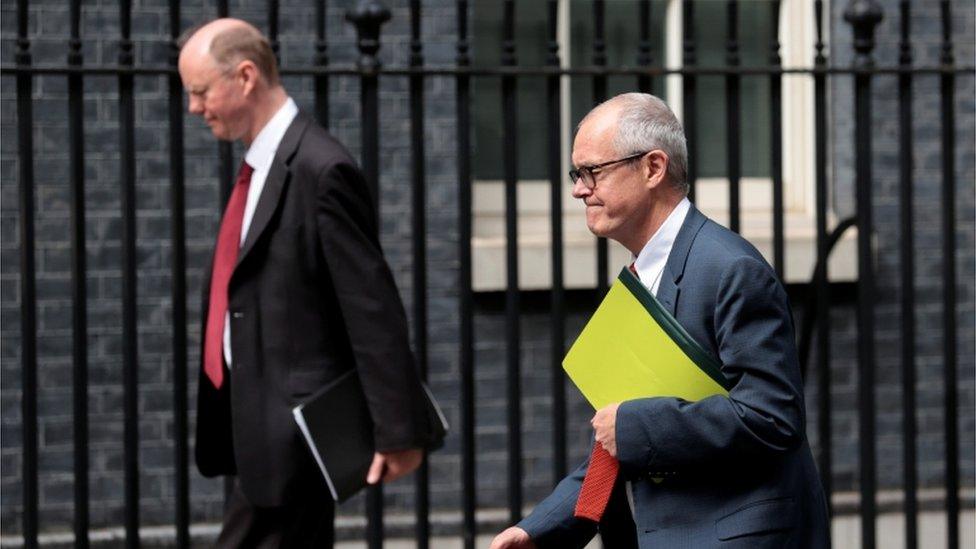
Chris Whitty and Patrick Vallance have been two of the key figures in forming the UK's coronavirus response
- Published16 June 2020
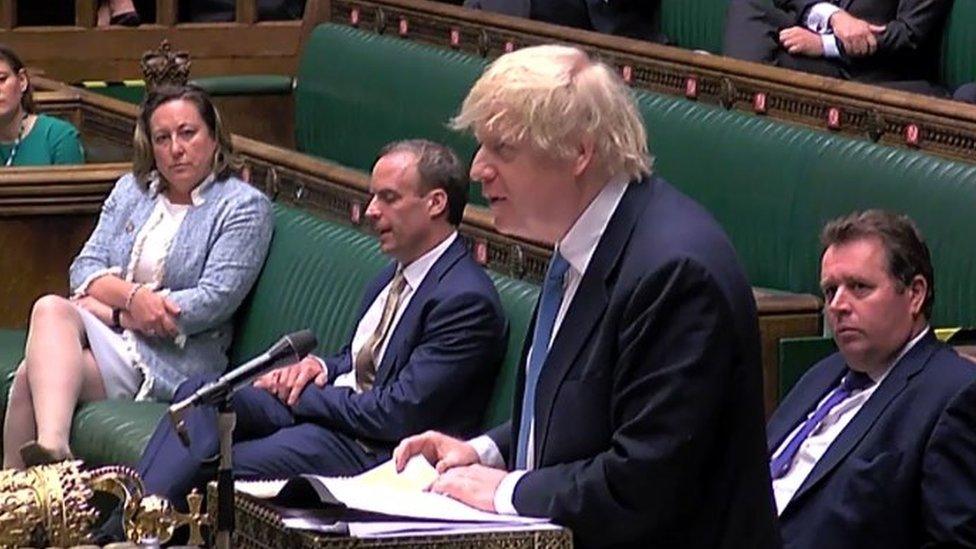
- Published8 July 2020
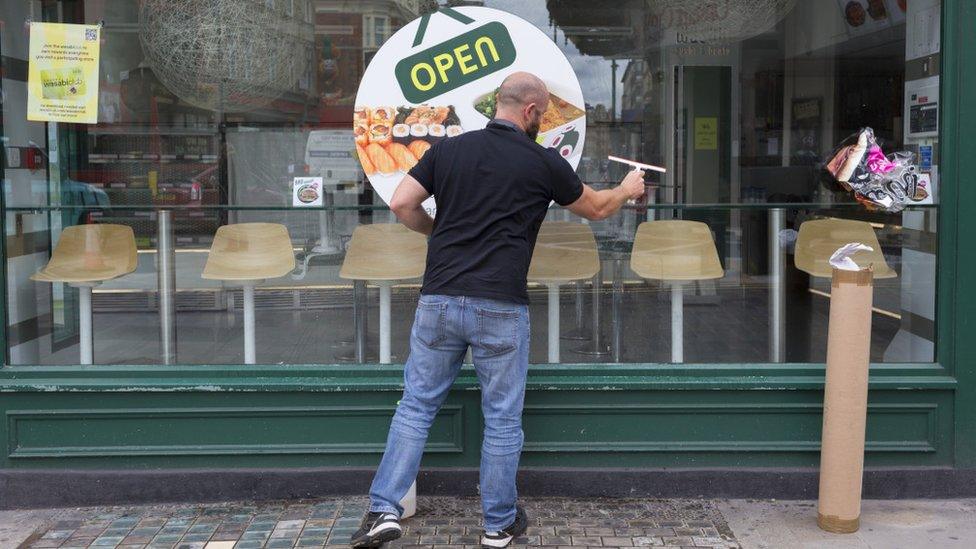
- Published22 May 2020
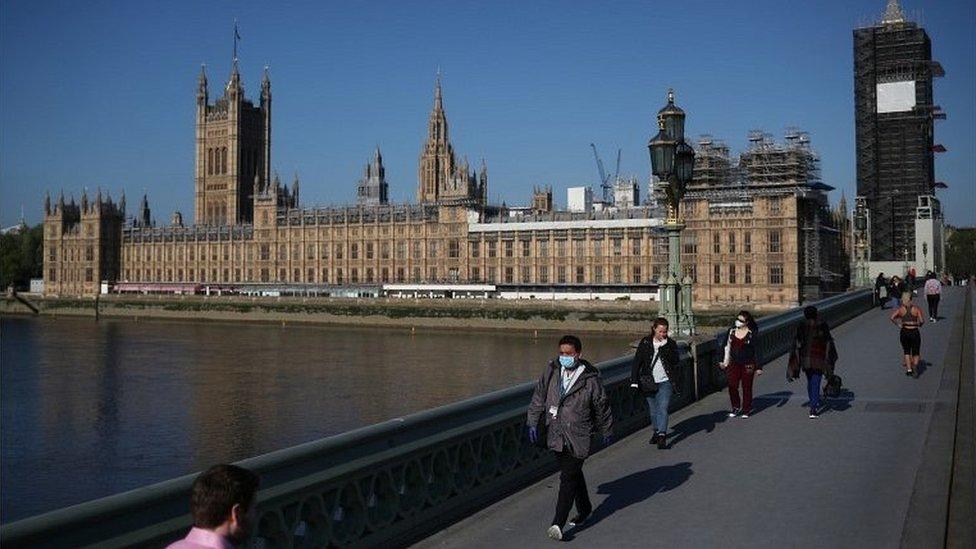
- Published10 July 2020
